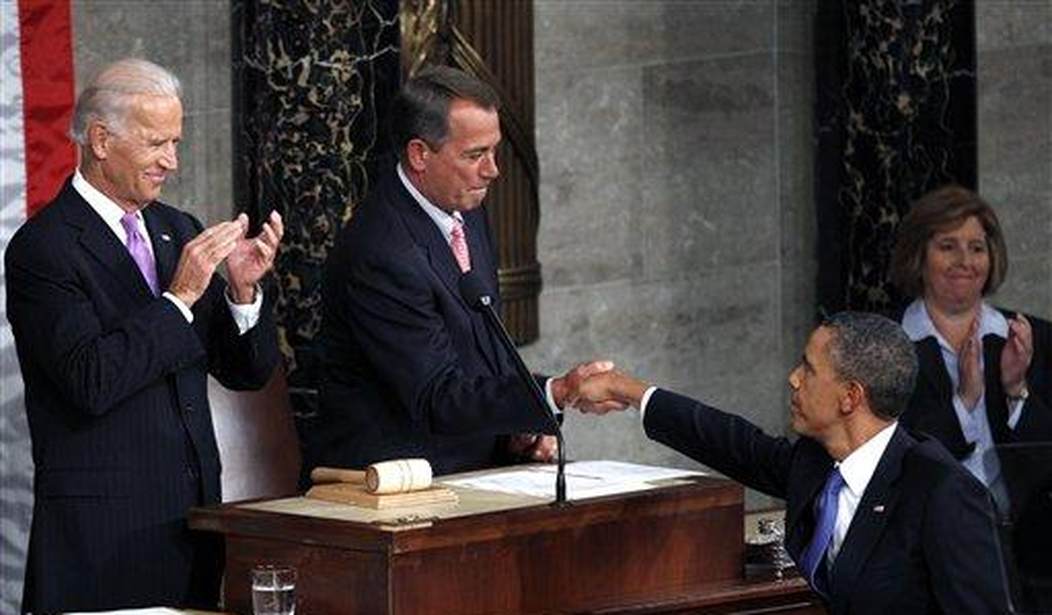The United States hit its so-called 'debt ceiling' last week, forcing the Treasury Department to begin its "extraordinary measures" contingencies to forestall a financial crisis that both sides of the aisle agree would be very harmful to the economy. The real deadline appears to be in June, and Democrats and Republicans are maneuvering ahead of a fight over a potential deal. Democrats say they want a simple and clean raise of the debt limit, with the White House insisting that it will not negotiate over the issue. Republicans are publicly signaling interest all sorts of potential concessions, but have not landed on a unified ask. This is the initial offer stage of the process, in which one side says there's no room for negotiations, and the other presents a laundry list of possible demands. Several months from now, it's fairly likely that one side will have abandoned its refusal to talk, and the other side will be focused on a dramatically pared-down set of requests.
Democrats will repeatedly argue that the debt ceiling must be raised, as a matter of America paying bills that it has already accrued, without inflicting terrible damage on the nation's full faith and credit. They'll note that President Trump suspended the debt limit while in office (which is true, even as he urges Republicans to hold a tough line in these negotiations, while sparing any changes to massive entitlement programs), and that the national debt exploded in historic fashion under Trump. That's also true to an extent, but a huge chunk of that spending came in the form of trillions of dollars in emergency measures during the teeth of the COVID pandemic. This spending was passed overwhelmingly, on a bipartisan basis. If anything, Democrats wanted much more spending, as is almost always the case. They went on to shovel nearly $2 trillion out the door in COVID relief in a wasteful, inflationary and partisan bill, shortly after Biden took office. They also came within a tiny handful of votes of spending $5 trillion more in a 'Build Back Better' package that was eventually pared down to a still-foolish spending binge risibly marketed as "inflation reduction."
Republicans may have spent too much money during the last administration, but Democrats are in absolutely no place to lecture anyone on fiscal responsibility, given their own unvarnished fiscal insanity. And for all their fulminating, Democrats could have raised the debt ceiling on their own before losing full control of Washington, but they chose to do other things. For their part, Republicans will note -- accurately -- that the debt ceiling has been raised after negotiations on multiple occasions. Indeed, the GOP is circulating reminders that during the last debt limit standoff, then-Vice President Joe Biden led the talks. His role was so central that the discussions were dubbed 'the Biden group' by some in the press. Here is a Washington Post dispatch from June of 2011:
Recommended
After six weeks of talks with congressional leaders aimed at restraining the spiraling national debt, Vice President Biden emerged Thursday with a blunt message: Now, the hard part begins. Next week, Biden said, negotiators from the White House and Capitol Hill will begin working “around the clock” to bridge the yawning philosophical divide between the two parties, as Democrats press for fresh revenue and Republicans push for significant cuts to federal health programs as part of the debt-reduction package. “Now we’re getting down to the real hard stuff: I’ll trade you my bicycle for your golf clubs,” Biden told reporters, adding that he remains optimistic that the talks will produce a tentative agreement before the July 4 break. “Everyone wants an agreement,” Biden said. “There’s no principal in that room that doesn’t want to get an agreement that bends the curve on the long-term debt, and that is sufficiently realistic to get us to $4 trillion over a decade or so in terms of [debt] reduction.” Biden spoke after emerging from the latest two-hour bargaining session at the U.S. Capitol with top administration officials and six lawmakers from the House and Senate. The group, which began meeting May 5, is rushing to assemble a debt-reduction package to ease passage of an increase in the legal limit on government borrowing, which is set at $14.3 trillion.
So a little more than a decade ago, Biden was a major player in precisely these sorts of talks, stating that "everyone" wanted to reach a deal, and conceding that bending the curve of long-term debt in a more sustainable direction was an important goal. As you can see, at that time, the borrowing limit was $14.3 trillion. That number is now $31.4 trillion, having more than doubled since 2011. Back in 1997, the number was just shy of $6 trillion. The escalation is obvious and very problematic. During that showdown, Republicans ultimately extracted a number of high-profile concessions out of Democrats and the Obama administration, but the debt has continued to skyrocket anyway. There's little room for optimism that the 2023 round of this battle will end with meaningful spending controls. In 2011, the GOP's hand was strengthened by a whopping win in the most recent elections, as well as by relative unity within the party. This time, Republicans are limping out of an underwhelming electoral cycle, control a very small House majority, and have already demonstrated a unity problem. On the other hand, the White House's refusal to negotiate at all doesn't seem likely to remain tenable, especially with a well-known Democratic Senator (perhaps trying to make up some of the political ground he's lost back home) already arguing in favor of bipartisan discussions:
Sen. Joe Manchin says the Biden White House is making the wrong call by not negotiating with Republicans on the debt ceiling. “I think it's a mistake because we have to negotiate … This is a democracy that we have. We have a two-party system.” pic.twitter.com/i0qRFmotoY
— Christopher Cadelago (@ccadelago) January 22, 2023
Top Republicans are sharing this clip widely, as you might expect. If a 'deal' is to be reached this time, Republicans will need to advance realistic, easily explained, popular goals, with unity. That may be a tall order. One of the better ideas I've heard comes from longtime Republican budget wonk Brian Riedl of the Manhattan Institute (whose latest piece on Republicans and spending is a must-read). On my radio show last week, he proposed Republicans could make their core request an official ending of the federally-declared COVID 'emergency' and its various authorities, perhaps paired with a cancellation or reallocation of unused "pandemic relief" funds. Other ideas are being floated by various individuals and groups on the Right. The aforementioned 'extraordinary measures' have bought some time. The White House is going to have to negotiate. Republicans need to get their act together and look like a team that is worthy of serious, good-faith negotiations.

























Join the conversation as a VIP Member